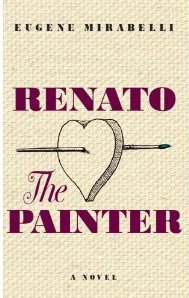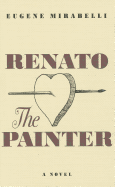 As is the case with many first-person novels, the hero of Eugene Mirabelli's Renato, the Painter is a foundling. When a baby appears on the doorstep of Bianca and Fidele Stilamore, they name the child Renato--Italian for "reborn"--and he grows up to become an artist whose fine work has failed to receive the accolades it deserves. (The same might also be said of Mirabelli himself.)
As is the case with many first-person novels, the hero of Eugene Mirabelli's Renato, the Painter is a foundling. When a baby appears on the doorstep of Bianca and Fidele Stilamore, they name the child Renato--Italian for "reborn"--and he grows up to become an artist whose fine work has failed to receive the accolades it deserves. (The same might also be said of Mirabelli himself.)
This sequel to earlier Mirabelli novels like The Passion of Teri Heart and The Goddess in Love with a Horse is a powerful, life-affirming story, a lusty, bawdy, hilarious romp through life as recounted by Renato in his old age. As a young boy, Renato enjoyed reading one of the few books in the Italian immigrant family's home: Benvenuto Cellini's Autobiography. As he grows up, his love of girls, then women, then drawing and painting, grows stronger and stronger until he feels he must devote his life to them (all of them). He marries, but that doesn't go well; although he loves his wife deeply, they remain apart--closely apart, that is, on opposite sides of Boston's Charles River, which only makes their relationship more hilarious and frustrating.
Later, a young woman, Avalon, the daughter of a close and dear friend, comes along with her son Kim. Renato just wants to help her out, but their relationship gradually evolves into something tender and beautiful: "Her hand glided from my shoulder to my flank with a caution so gentle it startled, she had a vigorous embrace and such tenderly inquisitive fingers as to doom a young man to her touch, and I was grateful to be old." Mirabelli's lovely, poetic prose, which fills his characterization of Renato to its brim, is a joy.
"Looking back, I'm baffled that I haven't done better," Renato reflects. "I don't mean painting; I've done all right painting even if nobody knows it. But I could have given more time to my friends, could have listened more and complained less, could have been more generous to everyone." Renato has done well, has lived and loved, and has served his mentor Cellini very well indeed. --Tom Lavoie
Shelf Talker: Once you've read this lovely novel, you'll be hunting down the rest of Mirabelli's stories, which form an extended history of the fictional Cavallo clan.
 "Fifty Shades is just the latest reminder of what makes the publishing industry important. Every half-decade the book business comes up with a title that crystallises what it means to put an author in touch with a reader: a relationship that can be both bountiful and long-lasting.
"Fifty Shades is just the latest reminder of what makes the publishing industry important. Every half-decade the book business comes up with a title that crystallises what it means to put an author in touch with a reader: a relationship that can be both bountiful and long-lasting.




SHELFAWARENESS.1222.S1.BESTADSWEBINAR.gif)




SHELFAWARENESS.1222.T1.BESTADSWEBINAR.gif)
 Builders Booksource
Builders Booksource Joy Press has been named books and culture editor at the Los Angeles Times
Joy Press has been named books and culture editor at the Los Angeles Times
 Chuck: It's hard to imagine 10 weeks from now.
Chuck: It's hard to imagine 10 weeks from now. The Washburn Bookstore at Washburn University, Topeka, Kan., is changing its name to the Ichabod Shop beginning this semester, according to the
The Washburn Bookstore at Washburn University, Topeka, Kan., is changing its name to the Ichabod Shop beginning this semester, according to the 
 Blood Crave
Blood Crave In a clever bit of cross-promotion, HBO has released a book trailer with a behind-the-scenes feel for
In a clever bit of cross-promotion, HBO has released a book trailer with a behind-the-scenes feel for  As is the case with many first-person novels, the hero of Eugene Mirabelli's Renato, the Painter is a foundling. When a baby appears on the doorstep of Bianca and Fidele Stilamore, they name the child Renato--Italian for "reborn"--and he grows up to become an artist whose fine work has failed to receive the accolades it deserves. (The same might also be said of Mirabelli himself.)
As is the case with many first-person novels, the hero of Eugene Mirabelli's Renato, the Painter is a foundling. When a baby appears on the doorstep of Bianca and Fidele Stilamore, they name the child Renato--Italian for "reborn"--and he grows up to become an artist whose fine work has failed to receive the accolades it deserves. (The same might also be said of Mirabelli himself.)